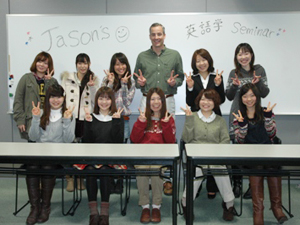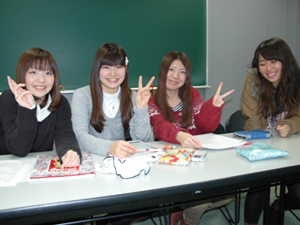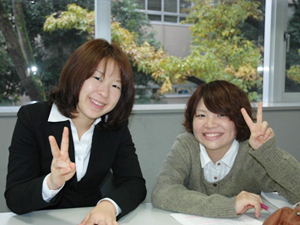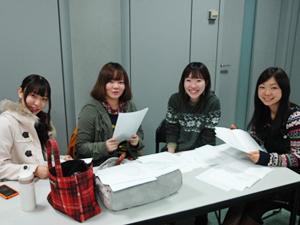人文学部ゼミブログ

2011.12.01
- 人文学部
- 英語英米文化学科
英語学ゼミナール(ジェイソン・ホロウェル)

以下の文章はホロウェル先生が英語学ゼミの内容について英語で書かれたものです。このゼミの特色は英語学を広くとらえた学習を行うことにあります。クラス では第1言語修得と第2言語修得および教授に関する3つのテーマが扱われます。前期にこれらのテーマについて様々なトピックを通じて学んだ後、いよいよ後 期からはトピックごとに3つのグループに分かれて、リサーチやフィールドワークを行います。それぞれのグループでどんな活動が行われているのか、ホロウェル先生の英文に挑戦して読み取ってみましょう。(英語英米文化学科准教授 岩佐 愛)
What is 英語学ゼミナール? This seminar adopts a liberal interpretation of 英語学 that expands beyond the traditional structural focus of linguistics to include fields related to language acquisition, learning, and use. We start out the year with a survey of various topics in this realm. The following are a few that establish a core from which students are able to then venture out from when it comes time for them to choose the topic that they wish to focus on and research.
First Language Acquisition: Learning how children begin, from a very early age, to process language is a good way to start thinking about language acquisition. The fact that children begin to identify patterns in intonation and are able to identify stories that were read to them by their mother before they were even born is one that surprises students and impresses upon them the intricacy of the language acquisition process.
Second Language Acquisition: Moving forward from first language acquisition, we briefly survey the second language acquisition process and students are given a chance to think about their own learning of a second language. One aspect of second language acquisition that we give special attention to is whether or not it is possible to acquire a second language in the same fashion as a first.
Second Language Teaching: Discussion and debate about the second language acquisition process and how it differs and resembles the first language acquisition process lead us into a discussion of language teaching and education. Students enjoy considering how they have studied and learned English and share opinions about their own experiences.
After surveying these and selected other topics related to English linguistics, as we interpret it, students are assigned the task of selecting a topic of interest upon which they then research and prepare discussion sessions and a final presentation. Selecting a suitable topic is difficult for students but the act of researching different ideas and discussing them with their teacher and other classmates is a learning process that most of them enjoy. After selecting a topic, doing some preliminary research and leading a discussion session in class, students dig deeper into the topic and prepare to give an academic presentation at the end of the first semester. In the fall semester, we use this same process but accelerate it and move rapidly into the research phase. In addition to traditional research, in the fall students are strongly encouraged to include some type of fieldwork in their research in order to deepen their knowledge and allow them to produce a richer report and presentation.
First Language Acquisition: Learning how children begin, from a very early age, to process language is a good way to start thinking about language acquisition. The fact that children begin to identify patterns in intonation and are able to identify stories that were read to them by their mother before they were even born is one that surprises students and impresses upon them the intricacy of the language acquisition process.
Second Language Acquisition: Moving forward from first language acquisition, we briefly survey the second language acquisition process and students are given a chance to think about their own learning of a second language. One aspect of second language acquisition that we give special attention to is whether or not it is possible to acquire a second language in the same fashion as a first.
Second Language Teaching: Discussion and debate about the second language acquisition process and how it differs and resembles the first language acquisition process lead us into a discussion of language teaching and education. Students enjoy considering how they have studied and learned English and share opinions about their own experiences.
After surveying these and selected other topics related to English linguistics, as we interpret it, students are assigned the task of selecting a topic of interest upon which they then research and prepare discussion sessions and a final presentation. Selecting a suitable topic is difficult for students but the act of researching different ideas and discussing them with their teacher and other classmates is a learning process that most of them enjoy. After selecting a topic, doing some preliminary research and leading a discussion session in class, students dig deeper into the topic and prepare to give an academic presentation at the end of the first semester. In the fall semester, we use this same process but accelerate it and move rapidly into the research phase. In addition to traditional research, in the fall students are strongly encouraged to include some type of fieldwork in their research in order to deepen their knowledge and allow them to produce a richer report and presentation.

As an example of the types of topics and research that students select, in the fall of 2011, the seminar group divided into three groups with the following research topics and fieldwork plans:

1. Deaf Culture – Language Acquisition Options for people with hearing impairment and comparisons between deaf culture and education in Japan and the U.S. – Students in this group are planning a visit to a school for the deaf here in Tokyo as well as interviewing (via e-mail) teachers and administrators from several deaf schools in the U.S.

2. Language Death – Exploration of the factors that contribute to language death and investigate of the history and current status of the Ainu language in Japan. Students in this group are planning a visit to the Ainu Language and Culture Center in Tokyo.
3. Language Education Policy – Students in this group are conducting a survey about language learning and teaching as well as interviewing educators from both Japan and the U.S. In addition they are hoping to visit the Ministry of Education in order to learn about its stance on English language teaching and learning in Japan.
Through this approach, the goal of this seminar is to motivate students to be proactive learners and to gradually empower them with critical thinking skills.
Through this approach, the goal of this seminar is to motivate students to be proactive learners and to gradually empower them with critical thinking skills.
